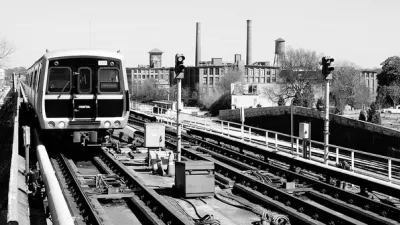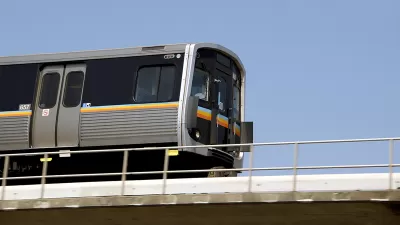Coronavirus and a heavy rail project doomed a transit sales tax in Gwinnett County, Georgia, according to this election post-mortem.

Arielle Kass and David Wickert report on the latest failure of a sales and use tax initiative to fund transit in Gwinnett County, Georgia, looking for an explanation for why voters in one of the counties that helped propel Joe Biden to the White House repeatedly votes against public transit.
"One thing is clear," according to the article: "The defeat can’t be blamed strictly on partisan politics. Democrats who won nearly every county office didn’t carry the transit vote with them. And several Republicans, including Nash, were supportive of the measure."
Kass and Wickert spoke with residents and local political officials for an explanation beyond partisan politics, some of which cited the plan for a $1.4 billion MARTA heavy rail extension from Doraville to Jimmy Carter Boulevard as a "boondoggle."
Others pointed to the mere presence of MARTA as a win for opponents of the measure, although the measure's proponents prioritized local control in the crafting of the proposed tax. "Dawkins, the chairman of the Gwinnett Transit Education Forum, said there was 'no substantive information' in a mailer he received, or on an opposition website that tied MARTA to the spread of the coronavirus. But he said those efforts found an audience," according to the article.
Another factor in the defeat, according to the article, was a general lack of knowledge of the transit sales tax on a crowded ballot. "More than 18,000 people who filled out ballots didn’t cast a vote on the referendum, and almost 5,000 people who voted in the race for county commission chair left that question blank," according to Kass and Wickert.
We've been here before with transit and Gwinnett County voters. Voters rejected a proposal for the county to join MARTA in a special election in March 2019 (despite a chorus of regret about the county's isolation among a growing regional collaboration on transit). Voters in Gwinnett County previously rejected MARTA in 1971 and 1990.
FULL STORY: Pandemic, long ballot, confusion may have cost Gwinnett transit vote

Planetizen Federal Action Tracker
A weekly monitor of how Trump’s orders and actions are impacting planners and planning in America.

Map: Where Senate Republicans Want to Sell Your Public Lands
For public land advocates, the Senate Republicans’ proposal to sell millions of acres of public land in the West is “the biggest fight of their careers.”

Restaurant Patios Were a Pandemic Win — Why Were They so Hard to Keep?
Social distancing requirements and changes in travel patterns prompted cities to pilot new uses for street and sidewalk space. Then it got complicated.

California Homeless Arrests, Citations Spike After Ruling
An investigation reveals that anti-homeless actions increased up to 500% after Grants Pass v. Johnson — even in cities claiming no policy change.

Albuquerque Route 66 Motels Become Affordable Housing
A $4 million city fund is incentivizing developers to breathe new life into derelict midcentury motels.

DC Area County Eliminates Bus Fares
Montgomery County joins a growing trend of making transit free.
Urban Design for Planners 1: Software Tools
This six-course series explores essential urban design concepts using open source software and equips planners with the tools they need to participate fully in the urban design process.
Planning for Universal Design
Learn the tools for implementing Universal Design in planning regulations.
Heyer Gruel & Associates PA
JM Goldson LLC
Custer County Colorado
City of Camden Redevelopment Agency
City of Astoria
Transportation Research & Education Center (TREC) at Portland State University
Camden Redevelopment Agency
City of Claremont
Municipality of Princeton (NJ)




























